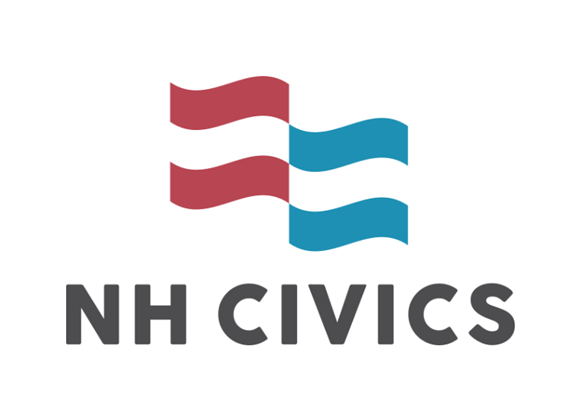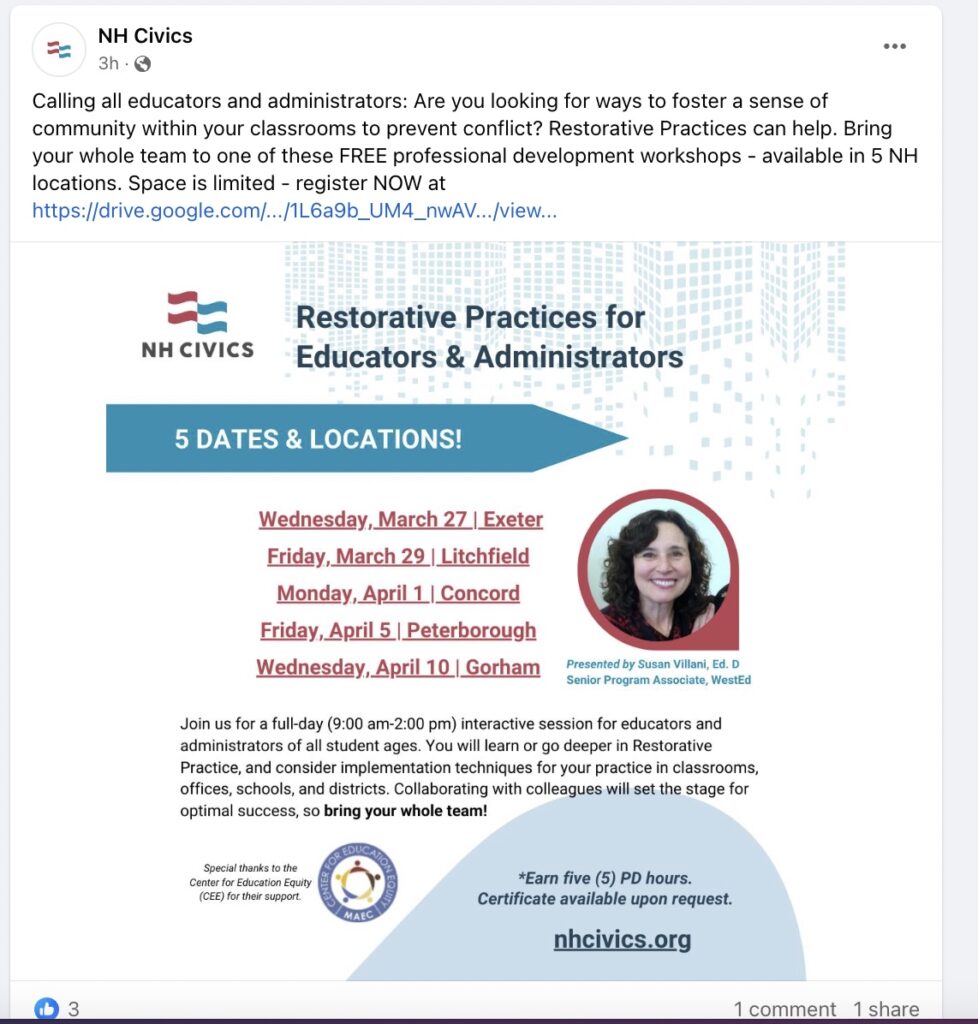With the desperate call to improve Civics Education for students in New Hampshire, you would think one of the most prominent Civics organizations would be at the forefront of making sure our students are literate in this important subject.
Numerous bills have come before The New Hampshire Education Committees, where legislators listened to the poor state of Civics literacy among New Hampshire students.
NH Civics has been criticized for its political leanings, which you can read about here and here. One would hope that an organization like this would ignore the politics, and stick to promoting Civics literacy. Unfortunately, that doesn’t seem to be the case.
Their latest initiative seems to involve classroom management through mental health therapy. What does that have to do with Civics education? That’s a good question.
Why is NH Civics, promoting mental health therapy in the classroom?
NH Civics is providing Professional Development in Restorative Practices for educators, and those who attend will earn Professional Development Hours. In other words, taxpayers will pay school employees to attend this event which is supposed to better prepare teachers for the classroom. But does it help?
In this article from the Fordham Institute, the author is highly critical of restorative circles used in the classroom, and even calls them unethical: (emphasis mine)
In the past decade, the role of the teacher in schools has slowly shifted from pedagogue to therapist. Perhaps the most glaring example of this shift is the practice called “circle conversations.” These circles are cousins of the non-punitive approach to discipline called restorative justice, and are intended to be community-building prophylactics.
While the ritual—I mean classroom practice—can vary from school to school, it has a few common characteristics: students sit in a circle, pass around a talking piece, and discuss open-ended questions, often deeply personal ones. The NEA wrote positively of a school that incorporates them into classrooms weekly.
Take a step back, however, and these circles closely resemble group therapy.
Once again, we can see the shift away from educating students, to turning our local schools into mental health clinics. But does it work? Is it ethical? How do you educate and train a public school teacher to become a therapist in the classroom? What about privacy issues?
Vendors are lining up to sell schools therapeutic programs that address the mental health of students, but none of these people are educated or trained in the field of Child Psychology.
…Consider a few example questions that one author at Edutopia suggests:
How does the state of your mental health affect you as a person?
What do you do to relieve stress?
Who would you like to forgive?
And now compare those to a few recommended questions at a counseling center:How do you think your negative thoughts influence your behavior?
What are some things that make you feel stressed? How are you coping with these things?
Is there anyone in your life you’re struggling to forgive? Why?
When did The New Hampshire legislature give authority to the schools to transition into medical or mental health centers?
Why are school administrators so heavily invested in turning their school into a mental health clinic? Think $$$$.
The federal government bypassed the Executive Council and the legislature and went directly to The New Hampshire Department of Health and Human Services with grant funding for the schools. Their vision is to turn the local public schools into the CDC’s (Center for Disease Control) model Community School. This is where public schools move away from teaching academics, and instead, become medical and mental health clinics.
Of course, that comes at a price to children who have had medical services administered without parental consent. Or in some cases, where school counselors shared personal mental health information on New Hampshire students without their knowledge or consent. We’ve already had two students vaccinated in Rochester and Nashua against their parents wishes. It looks like NH Civics is getting into the game.
Who is paying WestEd to push this agenda in our public schools? And why does NH Civics think this area is something that they should be promoting? They are having enough difficulty selling everyone on the belief that they actually care about teaching quality civics content to our students.
The classroom is no place for group therapy, yet here we are, watching SEL delve into the area of treating anxiety in young children. This document comes from SEL as taught in the Merrimack schools: (PAGE 5)
Newsletters (1)
This explains why, recently, a young girl came home from school to inform her parents that she believed she was depressed. She learned about it in school.
What can this do to your children? A lot, and it’s not good.
Take a listen to this podcast from Honestly with Bari Weiss. Bari interviewed Abigail Shrier about her new book, Bad Therapy: Why Kids Aren’t Growing Up.
Episode Description
American kids are the freest, most privileged kids in all of history. They are also the saddest, most anxious, depressed, and medicated generation on record. Nearly a third of teen girls say they have seriously considered suicide. For boys, that number is an alarming 14 percent.What’s even stranger is that all of these worsening mental health outcomes for kids have coincided with a generation of parents hyper-fixated on the mental health and well-being of their children.
Take, for example, the biggest parenting trend today: “gentle parenting.” Parents today are told to understand their kids’ feelings instead of punishing them when they act out. This emphasis on the importance of feelings is not just a parenting trend—it’s become an educational tool as well. “Social-emotional learning” has become a pillar in public schools across America, from kindergarten to high school. And maybe most significantly, therapy for children has been normalized. In fact, there are more kids in therapy today than ever before.
On the surface, all of these parenting and educational developments seem positive. We are told that parents and educators today are more understanding, more accepting, more empathetic, and more compassionate than ever before—which, in turn, makes wonderful children.
But is that really the case? Are all of these changes—the cultural rethink, the advent of therapy culture, of gentle parenting, of teaching kids about social-emotional learning—actually making our kids better?
Best-selling author Abigail Shrier says no.
In her new book, , Shrier argues that these changes are directly contributing to kids’ mental health decline. In other words: all of this shiny new stuff is actually making our kids worse.
Today: What’s gone wrong with American youth? What really happens to kids who get therapy but don’t actually need it? In our attempt to keep kids safe, are we failing the next generation of adults? And, if yes, how do we reverse it before it’s too late?
Schools need to return to teaching kids how to read, write, add, and subtract. Children who need mental health services need to find that help outside the school setting. Teachers can use assistance with techniques to address behavior, but this is not an open invitation to begin therapy in the classroom. This is unethical and can lead to bigger problems for your children.
So why is NH Civics involved in any of this? Was $$$ money involved?

